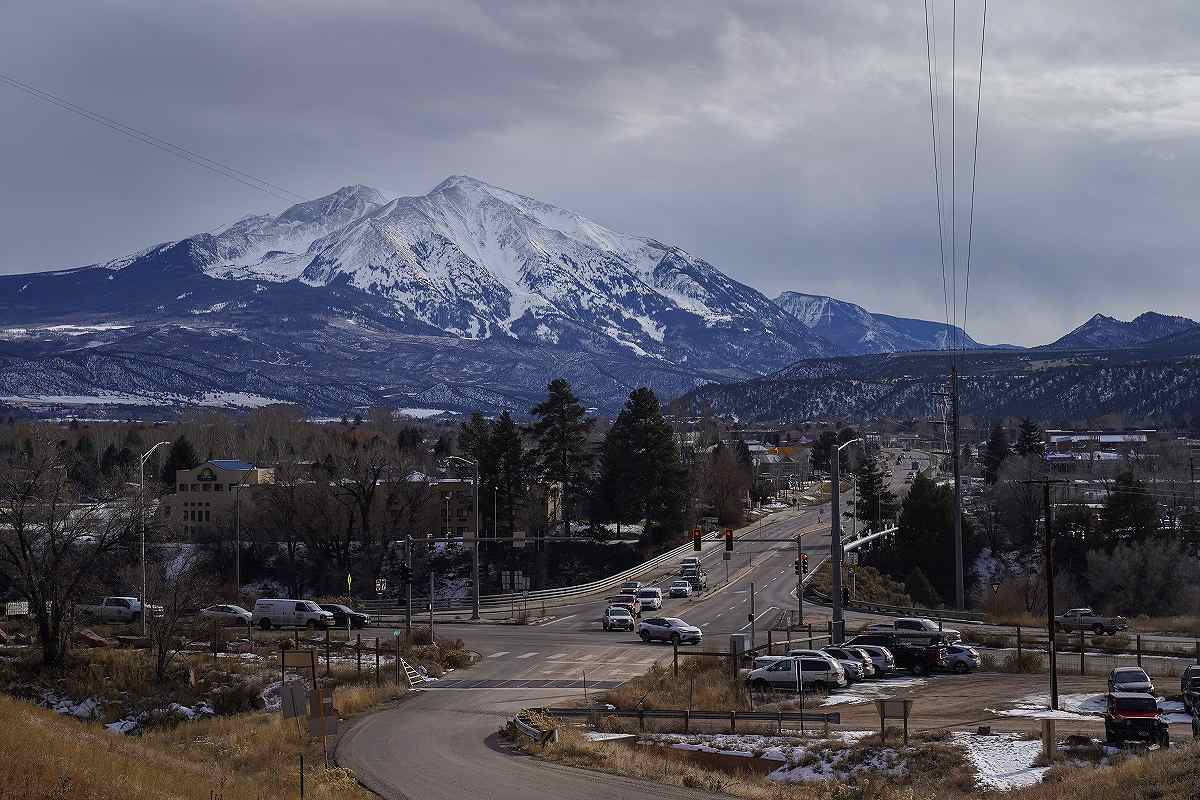
Mount Sopris towers over Carbondale, which is drawing Venezuelan migrants despite its remoteness.
15:17 JST, December 23, 2023
CARBONDALE, Colo. – This small mountain town sits 6,181 feet above sea level, 25 minutes from an interstate and 700 miles from the U.S.-Mexico border. But it is a new front line in a crisis spreading and straining local governments across the country.
As temperatures dipped well-below freezing one evening, dozens of young men, nearly all from Venezuela, rested on cots in an events hall now housing 60 migrants. In the snow-fringed dirt parking lot outside, dozens more prepared to spend the night in cars they had purchased in the weeks since they crossed into the United States and made this an unlikely haven down-valley from ritzy Aspen.
And at the town hall blocks away, the Carbondale Board of Trustees agreed to devote half its meeting room to bringing more “newcomers” out of the cold, even as they worried that doing so might draw others to a town with a bare-bones staff, no homeless shelter and no houses for sale under $1 million.
“We’re one little town of less than 7,000 people trying to figure this out,” said Mayor Ben Bohmfalk, who has told counterparts in the region that they should prepare for what he calls a humanitarian crisis: “You’ll probably feel these impacts in your community soon.”
Migrants crossed into the United States in record numbers this year in search of safety and opportunity, many of them Venezuelans who may be eligible for temporary protected status and work permits because of economic and political turmoil back home. Their arrivals have taxed border towns and overwhelmed cities hundreds of miles away, where packed shelters and tent encampments have become symbols of federal immigration failures.
Carbondale’s experience shows that remote parts of America are also being affected. In early November, residents were stunned when a regional Latino advocacy organization called attention to 80 migrants living under a bridge that spans the sparkling Roaring Fork River. They had been drawn by hopes of work in a place they heard had abundant labor shortages in the ski, hospitality, service and construction industries.
“The people here are very good,” said Yonathan Millan, 30, who crossed the border in July, was detained for three months and for a time lived in a car before moving to the temporary shelter. Though he is from Venezuela’s tropical coast, he wants to land full-time work and stay in the Colorado mountains. “With a permanent job, you can get an apartment,” he said.
Yet that is far from certain, according to area officials. Carbondale used to be the cheaper bedroom community to Aspen, 45 minutes away. It now has artsy bungalows and pricey restaurants, which these days are glittering with holiday lights. The school district is building housing for teachers, and the regional transit agency is renovating a hotel for bus drivers, because neither can afford to live here. Some people with full-time jobs couch surf or sleep in vehicles.
“While I have a lot of sympathy for our new residents,” Trustee Marty Silverstein said, “we have people that have been living here for five, 10 years that are severely struggling.”
It’s even harder for low-wage workers, many of them immigrants, said Alex Sanchez, executive director of Voces Unidas, a regional advocacy group that has pivoted to helping the new migrants. The Roaring Fork Valley has long been a destination for Latinos, who today make up 40 percent of Carbondale’s population. Many live in decrepit mobile homes, their needs largely ignored by local governments, Sanchez said.
The Venezuelans’ lack of connections and shelter here made them more visible – to a point.
They had already been under the bridge for weeks, clustered near a raft launch, when Sanchez learned about them. He and a state lawmaker visited the site, then immediately set up meetings with government officials and nonprofits.
“It takes a village to choose not to see 80 unhoused Latinos living under the bridge, in fall, getting close to winter,” he said. “We were shocked.”
Charities put up the few families in area hotels. The director of the Third Street Center, a former elementary school that now rents spaces to artists and a ballet studio, designated the gym a shelter. Voces Unidas helped the migrants elect a nine-person leadership committee to maintain order. Volunteers provided breakfasts and dinners.
“People need a hot meal,” Andrea West, 44, said on a Tuesday morning as she and three friends served fruit, bacon and other foods they had brought. West, who lives in the neighboring city of Glenwood Springs, signed up after reading news about the migrants and their long, dangerous treks toward better lives.
“You can only imagine what they’ve been through,” she said. “This can only be better. You’ve got the elements to contend with. But it’s better than being robbed, or worse.”
The center was meant to be a short-term solution, and director Colin Laird said it is far from sufficient. Showers are blocks away at town hall or the rec center. Trash piles up and the plumbing clogs. The shelter’s first covid cases were reported in mid-December. Neighbors’ patience is being stretched, she said.
“Carbondale is generally pretty Democratic and liberal, so we’re getting a lot of: You’re doing the right thing,” said Laird, who is also a town trustee. “Unfortunately, we don’t have the capacity for the right thing anymore.”
The board of trustees has committed to supporting shelter for up to 100 people through March, when the harsh winter gives way to warmer temperatures, and enlisted a former schools superintendent to manage the situation. But it is still scrambling to find space. Town Manager Lauren Gister said more than a dozen sites in the region, including an empty supermarket, declined to assist. Nearby towns and counties have offered cots and coronavirus tests but little else, she said.
Though Bohmfalk doesn’t want Carbondale to become a destination for migrants, he has requested nearly $224,000 in state emergency funds for those already in town. He noted in a letter that the group, now estimated to number more than 120, “effectively increased the town’s unhoused population by approximately 500 percent and increased the town’s population by 2 percent.”
The mayor said he was astonished that the federal government offers no resources or guidance to help municipalities cope. A $1.4 billion request for that purpose by the Biden administration is included in a funding request now stalled in Congress.
“At the end of the day, we can’t in Carbondale right now influence what’s going on at the border,” Bohmfalk said he tells the occasional angry residents who ask him why the town should help. What it can influence are the lives in its midst. “These people are sleeping outside.”
Inside the Third Street gym this month, the light was dim, but the air was warm. Tween girls in tights waited in a hallway for a class to begin in the dance studio. Migrants passed by on the way to the bathrooms.
Millan sat at a high table, flipping through photos on his phone. The 30-year-old, who worked as a driver in Venezuela and entered Texas in July, had earned a bit of money that day cleaning cars. It wasn’t much to send home to his mother, siblings and 9-year-old daughter. But it was better than in Denver, he said, where too many migrants compete for too few jobs.
He hopes that temporary protected status, for which Voces Unidas says he and many of his fellow migrants in Carbondale qualify, may lead to something stable – including something more resembling a home.
“This man opened his door to us without knowing us. He’s a very good person,” Millan said of Laird. “But you want more privacy.”
Oscar Flores and Yusbeily Vargas, by contrast, had none. With two other migrants, they were sharing a Kia Sorento, which Flores purchased for $1,200.
“Our home,” joked Flores, 21, gesturing in the center’s parking lot toward the car. Its trunk was stuffed with belongings, and two stuffed dolls adorned the dashboard. He pointed to the seats. “This is the living room.”
Vargas, 24, had just gotten back from a day helping to clean two houses in Glenwood Springs for $20 an hour. Flores had found no work, but he had met a man who owned a party-rental business and told him to get in touch in January.
Flores put the man’s card in the pocket of his lightweight puffer coat. The Kia would need to sustain them until that work might be able to pay for a hotel.
“Stronger cold is coming,” he said. “We can’t stay here.”
Top Articles in News Services
-

Survey Shows False Election Info Perceived as True
-

Hong Kong Ex-Publisher Jimmy Lai’s Sentence Raises International Outcry as China Defends It
-

Japan’s Nikkei Stock Average Touches 58,000 as Yen, Jgbs Rally on Election Fallout (UPDATE 1)
-

Japan’s Nikkei Stock Average Falls as US-Iran Tensions Unsettle Investors (UPDATE 1)
-

Trump Names Former Federal Reserve Governor Warsh as the Next Fed Chair, Replacing Powell
JN ACCESS RANKING
-

Producer Behind Pop Group XG Arrested for Cocaine Possession
-

Japan PM Takaichi’s Cabinet Resigns en Masse
-

Man Infected with Measles Reportedly Dined at Restaurant in Tokyo Station
-

Israeli Ambassador to Japan Speaks about Japan’s Role in the Reconstruction of Gaza
-

Videos Plagiarized, Reposted with False Subtitles Claiming ‘Ryukyu Belongs to China’; Anti-China False Information Also Posted in Japan























